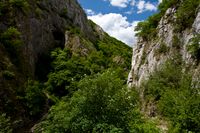Trascău Mountains
The locality
Rimetea is located in the historical Romanian region of Transsylvania, the "land beyond the forest". Its former name "Trascău" is eponymic for the Trascău Mountains, situated in the Southeastern part of the Apuseni mountain range in the Western Carpathian Mountains.
The municipality of about 1,000 inhabitants is located on the eponymous river Rimetea which leads into the Aries river. Archaeological findings from the Neolithic, Early Bronze and Roman Ages suggest a long settlement history in the area. Rich iron ore deposits attracted a flourishing mining industry from the 15th century on till the early 20th century.
Present-day Rimetea is mainly characterised by its natural and cultural diversity: the municipality received a Europa Nostra award in 1999, underlining its rich cultural heritage.
The habitat
The Trascău Mountains mainly consist of limestone, which makes for a diverse karst landscape with several hundreds of caves. The result is a rich calcific flora and fauna, which is why the Trascău Mountains have been declared a European Natura 2000 area. The most species-rich Lepidoptera habitats in this area are south-facing mountain steppe grasslands, flower-rich meadows and extensively cultivated pastures.
Contact person
Prof. Dr. László Rákosy
Babes-Bolyai University, Faculty of Biology and Geology, Dept. of Taxonomy and Ecology
Mihail Koyaliceanu No. 1, RO-400084 Cluj-Napoca, Romania
laszlorakosy(at)hasdeu.ubbcluj.ro
